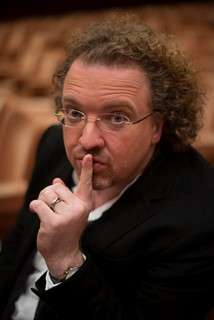|
Back
Denève’s sonic sessions Philadelphia
Verizon Hall
04/19/2018 - & April 20, 21*, 2018
Guillaume Connesson: Flammenschrift
Sergei Prokofiev: Violin Concerto No. 1 in D major, opus 19
Richard Strauss: Death and Transfiguration, opus 24
Maurice Ravel: La Valse
Vadim Repin (violin)
The Philadelphia Orchestra, Stéphane Denève (conductor)

S. Denève (© Bram Goots)
Principal guest conductor Stephane Denève was on the Philadelphia Orchestra podium for two weeks of programming in April that started and with a special concert event with for master cine-composer John Williams. Denève’s weekend concert series that followed included big sonic orchestra waves that rivaled Williams, with music by Prokofiev, Ravel, Strauss and contemporary French composer Guillaume Connesson. Of course, with Denève at the controls, it was so much more than just pumping up the volume.
Connesson’s Flammenschrift, ostensibly an homage to Beethoven and Germany (the second of a trilogy by the composer honoring to music of Russia and Italy) kicked off the concert in high volume gear. Flammenschrift is so cinematic, it recalled the hot-house atmospherics Bernard Herrmann rendered in Hitchcock films. Connesson’s surging strings, dramatic pauses, roiling orchestral sub-streams reach a symphonic boil, and just stay there, with Denève articulating the effects with razor- sharp precision.
Next Russian violinist Vadim Repin performed Prokofiev’s Violin Concerto No. 1 stepping in for Hilary Hahn, Philadelphia Orchestra artist in residence this season, who is expecting her second baby. This early work by a young Prokofiev was composed in 1915-1917, the last work before he left Russia. And it wasn’t heard until it was performed in Paris in 1923. It is fascinating in that it has glimpses of his future symphonic signatures and also seems so unlike most of the composer’s other work. Repin seemed tight in the first movement which, already has a searching quality, unfocused quality. In fact, Christopher H. Gibbs program notes point out that Prokofiev criticized the concerto’s first and third movements himself by the time it was performed in Paris in 1923. Repin really caught a wing in the second movement (Scherzo), soaring through vertiginous string runs, and nailing those staccato lines – he essayed Prokofiev’s intended sarcastic jagged edges of some of the passages. One could imagine Hahn performing it with a richer tone virtuosity, but Repin brings equal mystique in his edgier technical interpretation.
Denève told the audience that Richard Strauss intended Death and Transfiguration as a literal orchestral narrative of a man contemplating his final hours. Denève view is more apocalyptic and pumped its sonic dimensions to optimal effect, to italicize Strauss’ implications in this globally perilous time. Denève unleased its structural power, a dazzling showcase for the winds, brass and strings. Among the many outstanding principals, flutist Jeffrey Khaner and concertmaster David Kim entranced with soulful orchestral solace.
Not so surprising that the concert stealer ended up being Ravel’s La Valse or that Denève just changed the acoustic in the concert hall with the performance. It was the only work at this performance that he didn’t have a score in front of him. Denève free hand floating over the conductor circle, he dives into Ravel’s waltz time that conjures a vortex of waltzing couples that careen out of control. In the final moments, the orchestra unleashes its disquieted power, its quality of a slow motion passage that snaps into real time. Much symbolism has been inferred on La Valse since its premiere in the aftermath of WWI, and Ravel’s characterization “in my mind, the impression of a fantastic, fatal whirling.” The symbolism, intended or not, is musically profound still, especially as render by The Philadelphians on this night.
Lewis Whittington
|